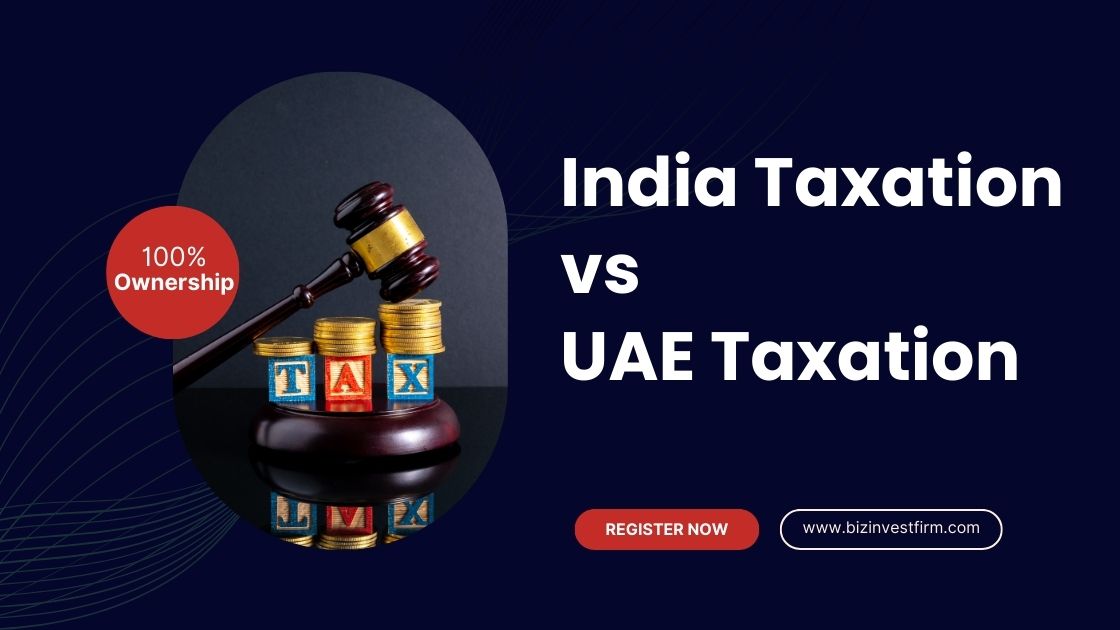When it comes to running a business, taxes play a massive role in determining profitability. Entrepreneurs often weigh their options between countries to find the most cost-effective environment. This article dives into a detailed comparison of tax systems in India and the UAE, exploring how much you could save by setting up shop in the UAE.
Why Taxation Matters for Businesses
Taxes directly impact your bottom line. A high tax burden can eat into profits, leaving less room for reinvestment or growth. By understanding the differences between tax regimes, you can make smarter decisions about where to base your operations.
The UAE has long been a magnet for businesses due to its low-tax environment. Meanwhile, India’s complex tax structure can pose challenges for companies. Let’s break it down step by step to see how these two systems stack up and why the UAE might be a game-changer for your business savings.
Overview of India’s Tax System
India operates a multifaceted tax system with both direct and indirect taxes. Businesses face a mix of corporate income tax, goods and services tax (GST), and additional compliance requirements. While reforms have simplified some aspects, the overall framework remains intricate.
Corporate Tax in India
Domestic companies in India face a base corporate tax rate of 25% if their turnover exceeds INR 400 crore (about $48 million USD). New manufacturing companies can opt for a reduced rate of 15%, but this comes with conditions like forgoing certain deductions. Add surcharges (7%-12%) and a 4% health and education cess, and the effective rate often climbs to 30% or more.
Goods and Services Tax (GST)
Introduced in 2017, GST replaced a patchwork of indirect taxes. Rates range from 5% to 28%, with most business transactions falling under the 18% slab. Compliance involves monthly and quarterly filings, which can be time-consuming and costly for small businesses.
Other Taxes and Contributions
Businesses in India must also contend with provident fund contributions (12% of employee salaries), professional taxes (varying by state), and property taxes. These additional costs add layers of complexity and expense.
Overview of the UAE’s Tax System
The UAE takes a radically different approach, prioritizing simplicity and low rates to attract global businesses. Known for its tax-friendly policies, it’s a hub for entrepreneurs seeking to maximize savings. Let’s explore the key components of UAE taxation.
Corporate Tax in the UAE
Until recently, the UAE had no federal corporate tax. In 2023, a 9% corporate tax was introduced for profits exceeding AED 375,000 (about $102,000 USD). Businesses earning below this threshold pay nothing, and free zone companies meeting specific criteria can still enjoy 0% tax—a stark contrast to India’s higher rates.
Value Added Tax (VAT)
The UAE implemented VAT in 2018 at a flat rate of 5%. This applies to most goods and services, though essentials like healthcare and education are often exempt or zero-rated. Compared to India’s 18% GST average, this is a significant saving.
No Personal Income Tax
One of the UAE’s biggest draws is the absence of personal income tax. Entrepreneurs and employees keep 100% of their earnings, unlike in India, where individuals face progressive tax rates up to 42.74% (including surcharges).
Direct Comparison: India Taxation vs UAE Taxation
To truly grasp the savings potential, let’s compare the two systems head-to-head across key tax categories. This side-by-side look highlights why the UAE often comes out ahead for businesses.
Corporate Tax Comparison
- India: 25%-30% effective rate (with surcharges and cess).
- UAE: 9% on profits above AED 375,000; 0% for smaller businesses or qualifying free zone entities.
A company earning $1 million in profit would pay around $300,000 in India but only $90,000 in the UAE (assuming no free zone benefits). That’s a savings of $810,000 annually.
Indirect Tax Comparison
- India: GST at 18% on average.
- UAE: VAT at 5%.
For a $500,000 revenue stream subject to indirect tax, India’s GST would cost $90,000, while UAE’s VAT would be just $25,000—a $65,000 difference.
Personal Income Tax Comparison
- India: Up to 42.74% for high earners.
- UAE: 0%.
An entrepreneur earning $200,000 personally would owe $85,480 in India but nothing in the UAE, pocketing the full amount.
How Much Can You Save? A Case Study
Let’s put numbers to the test with a hypothetical business scenario. Imagine a tech startup generating $2 million in annual revenue, with $500,000 in taxable profit and $100,000 in taxable sales.
Tax Costs in India
- Corporate Tax: $500,000 x 30% = $150,000.
- GST: $100,000 x 18% = $18,000.
- Total Tax: $168,000.
Tax Costs in the UAE
- Corporate Tax: ($500,000 – $102,000) x 9% = $35,820.
- VAT: $100,000 x 5% = $5,000.
- Total Tax: $40,820.
Savings Calculation
- India Total: $168,000.
- UAE Total: $40,820.
- Savings: $127,180 per year.
This startup could save over $127,000 annually by operating in the UAE—money that could fuel expansion, hiring, or innovation.
Additional Savings Beyond Taxes
The UAE offers more than just tax breaks. Its business-friendly ecosystem amplifies your savings in other ways. Here’s how:
Free Zones
The UAE’s free zones provide 100% foreign ownership, no customs duties, and tax holidays for up to 50 years. India has special economic zones (SEZs), but they come with stricter rules and fewer tax benefits.
Lower Compliance Costs
India’s tax system demands extensive paperwork—monthly GST filings, annual income tax returns, and more. The UAE’s streamlined processes reduce administrative overhead, saving time and money.
Infrastructure and Connectivity
Dubai and Abu Dhabi boast world-class infrastructure, from ports to airports, making logistics cheaper and faster. India’s infrastructure, while improving, often lags behind, increasing operational costs.
Double Taxation Avoidance Agreement (DTAA)
The India-UAE DTAA, signed in 1993, prevents businesses from being taxed twice on the same income. For example, profits earned by a UAE company in India may only be taxed in the UAE at 9% (or 0% in free zones). This treaty enhances savings for cross-border operations.
Key DTAA Benefits
- Interest Income: Taxed at 12.5% max in the source country.
- Dividends: Capped at 10%.
- Capital Gains: Taxed only in the resident country (often 0% in the UAE).
This agreement ensures you’re not double-dipped, making the UAE even more attractive.
Why Choose Bizinvestfirm?
Navigating tax systems and relocating a business can feel overwhelming. That’s where Bizinvestfirm comes in. We specialize in helping entrepreneurs transition to the UAE seamlessly.
Expert Guidance
Our team understands both UAE taxation vs India taxation inside out. We’ll analyze your business model and pinpoint the best tax-saving strategies tailored to you.
End-to-End Support
From company setup in UAE free zones to visa processing, Bizinvestfirm handles the details. We ensure compliance with local laws so you can focus on growing your business.
Proven Track Record
With years of experience, we’ve helped countless businesses slash their tax bills and thrive in the UAE. Our clients save millions annually, and we’re ready to do the same for you.
Challenges of Moving to the UAE
While the savings are compelling, relocating isn’t without hurdles. Understanding these challenges helps you plan effectively.
Initial Setup Costs
Setting up in the UAE involves fees for licenses, visas, and office space. However, these are often offset by long-term tax savings within a year or two.
Cultural Adjustment
Adapting to a new market and culture takes effort. Bizinvestfirm offers local insights to ease this transition.
Regulatory Nuances
The UAE’s rules, especially in free zones, require careful navigation. Our experts ensure you meet all requirements without surprises.
Who Benefits Most from UAE Taxation?
Not every business will see the same savings. Certain industries and profiles stand to gain the most.
High-Profit Businesses
Companies with large profit margins—like tech, trading, or consulting—save significantly due to the low corporate tax rate.
Exporters and Importers
Free zones eliminate customs duties, making the UAE ideal for trade-focused firms.
Entrepreneurs and HNIs
With no personal income tax, individuals relocating to the UAE keep more of their wealth.
Long-Term Financial Impact
Choosing the UAE isn’t just about immediate savings—it’s a strategic move for sustained growth. Lower taxes mean more capital to reinvest, hire talent, or expand globally. Over a decade, the compounded savings could reach millions.
5-Year Savings Projection
| Year | India Tax Cost | UAE Tax Cost | Annual Savings | Cumulative Savings |
|---|---|---|---|---|
| 1 | $168,000 | $40,820 | $127,180 | $127,180 |
| 2 | $168,000 | $40,820 | $127,180 | $254,360 |
| 3 | $168,000 | $40,820 | $127,180 | $381,540 |
| 4 | $168,000 | $40,820 | $127,180 | $508,720 |
| 5 | $168,000 | $40,820 | $127,180 | $635,900 |
This table assumes consistent profits and tax rates, showing a potential $635,900 saved over five years.
Practical Steps to Relocate Your Business
Ready to make the move? Here’s a roadmap to get started.
- Assess Your Business: Calculate current tax costs in India and project UAE savings.
- Choose a Free Zone: Select one aligned with your industry (e.g., IFZA, DWTC for tech).
- Partner with Bizinvestfirm: Let us handle registration, visas, and compliance.
- Set Up Operations: Establish your office and start trading.
- Leverage Savings: Reinvest the extra cash into your business.
India Taxation vs UAE Taxation: Final Thoughts
The numbers don’t lie—operating in the UAE can slash your tax burden dramatically. From a 9% corporate tax to 0% personal income tax, the savings are clear compared to India’s higher rates and complex compliance. For businesses aiming to maximize profits, the UAE is hard to beat.
Whether you’re a startup or an established firm, the UAE taxation vs India taxation comparison favors the Emirates for cost efficiency. With Bizinvestfirm by your side, the transition is smooth, and the rewards are immediate. Why let taxes hold you back when a world of savings awaits?
Take Action Today
Don’t leave money on the table. Contact Bizinvestfirm to explore how much you could save by moving to the UAE. Let’s turn tax savings into your competitive edge—starting now.



